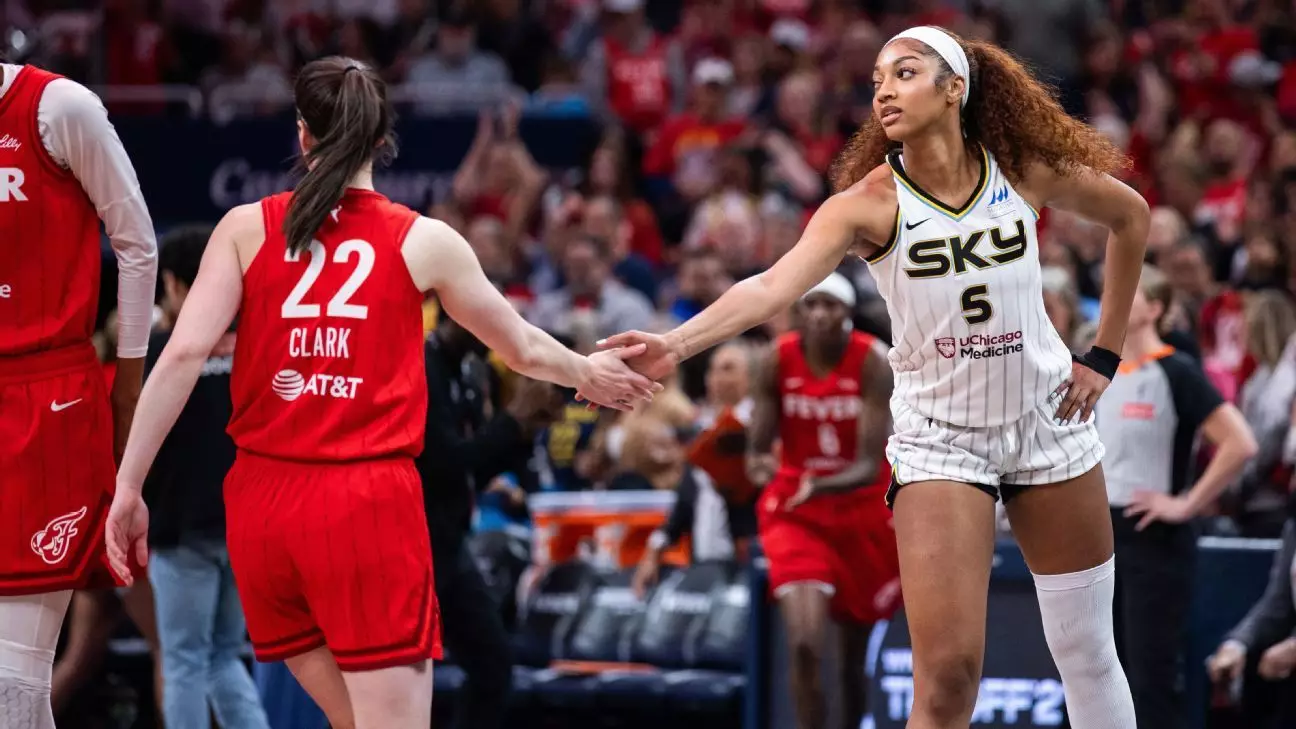The world of sports, often seen as a sanctuary where competition and camaraderie flourish, can unexpectedly unveil a darker side. The shocking allegations emerging from the recent WNBA season opener between the Indiana Fever and the Chicago Sky have ignited discussions surrounding fan behavior, player safety, and the integrity of the game. It is astonishing that in an era where we should be celebrating inclusivity and respect, events like this remain prevalent. Allegations of “hateful fan comments” aimed at Sky player Angel Reese, following an on-court incident, epitomize the unfortunate reality that some individuals can’t seem to separate their passions from decency.
As fans flock to arenas, one would hope the environment would resemble a celebration of athletic prowess rather than a breeding ground for hostility. Indiana Fever guard Caitlin Clark has poignantly stated, “There’s no place for that in our game, there’s no place for that in society.” Yet, here we are, needing reiteration of such fundamental principles. What is it about sports that sometimes awakens the worst in people? Are highly charged emotions a license for disrespect? Simply put, they are not, and it is time for all stakeholders in the sporting community to step up and ensure a culture of respect prevails on and off the court.
Systemic Issues: Ignoring the Root Cause
The gravity of the situation extends beyond just one isolated incident. Social media highlights that hateful remarks were made, suggesting that we are grappling with a systemic issue that won’t simply disappear with an investigation. While an investigation by the WNBA is necessary, it reminds us that these comments are not just random outbursts but, rather, part of a larger, troubling phenomenon. What are we doing to educate fans about appropriate conduct during games? How are teams cultivating a culture of respect at their venues? The accountability should not only rest with the league but also with the teams and their fanbases.
Indiana Fever player’s reactions to the incident indicate a strong sense of unity and a commitment to maintaining a respectable environment. The notion that players must educate fans about acceptable behavior suggests that there is a significant gap in understanding what sporting events should embody. Aliyah Boston’s remarks about the importance of decorum illustrate that players are conscious not only of the game but also of the environment surrounding it. Fans should not only cheer but also embody the sportsmanship their heroes display on the court. It’s a call to action that has yet to resonate fully within arenas across the country.
Empowering Athletes to Speak Up
DeWanna Bonner’s emphasis on “zero tolerance” for hate in the sports community emphasizes the urgency of addressing this issue. It is heartening to see seasoned athletes who have witnessed the highs and lows of the sport openly advocate against such behavior. If players are empowered to call out disrespect while fostering a welcoming atmosphere for all, the trajectory of fan behavior could shift significantly. Bonner nailed it when she mentioned the need for mutual respect, stating that “we as players have to make sure that fans know it’s OK to be passionate.” This understanding is paramount.
This incident serves as a reminder that the framework of sportsmanship must extend beyond the game itself. Athletes are not just entertainers but also role models. Their voices can wield significant power, capable of transforming how fans approach games. It is about not only holding fans accountable but also reinforcing the idea that respect is non-negotiable in athletics. This should be the gospel preached within the halls of every sports organization and in every arena in the country.
A Collective Responsibility
The onus does not lie solely on the players or the league entities; it is a collective responsibility shared by everyone involved in the sport. Coaches, team management, and fans all play pivotal roles in shaping the culture. It should be understood that the broader culture of a sporting event impacts the morale and performance of the players on the court. The spirit of competition should foster unity, community, and respect rather than division and hostility.
Therefore, as we rally behind our favorite teams, let’s commit to a more positive environment in sports. Conversations around creating better experiences for players should transcend the momentary emotions of victory or defeat. We have a unique opportunity to redefine the culture surrounding sport – to move it beyond mere competition and toward a more inclusive space. As we stand united against hate, let’s take strides to ensure that in our pursuit of victory, we cultivate an atmosphere that honors every participant’s dignity.

Leave a Reply